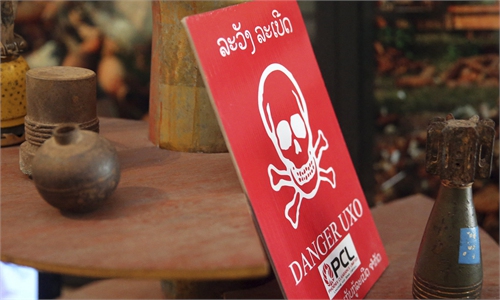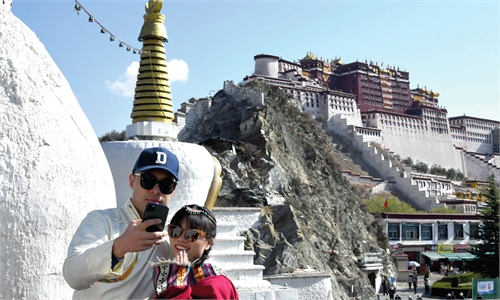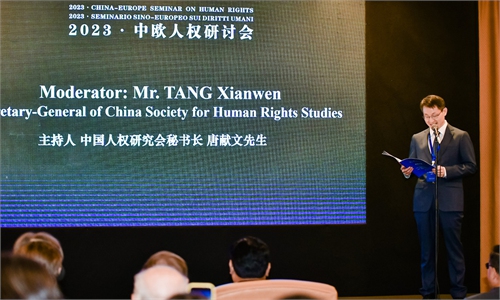IN-DEPTH / IN-DEPTH
Chinese, European scholars call for cooperation, dialogue amid alarming trend of politicization, instrumentalization of human rights
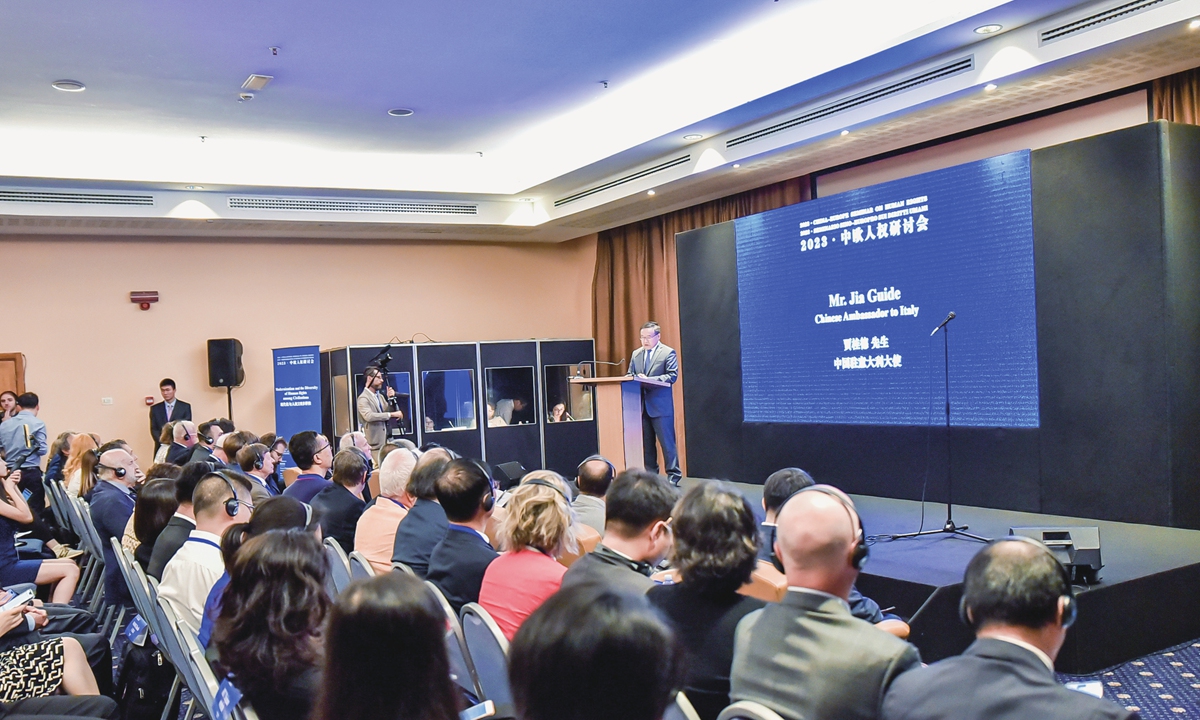
Chinese Ambassador to Italy Jia Guide speaks at the 2023 China-Europe Seminar on Human Rights on September 20, 2023, in Rome, Italy. Photos: Courtersy of China Society for Human Rights Studies
Editor's Note:
On September 20, the 2023 China-Europe Seminar on Human Rights was held, co-hosted by a Chinese think tank, the China Society for Human Rights Studies (CSHRS), and the Faculty of Law at Sapienza University of Rome in Italy. Global Times reporters attended the seminar in Rome and talked with Chinese and international experts with many of them agreeing that although the human rights cause is facing the challenges of politicization and instrumentalization, the strong desire for exchanges between Chinese and Western political and academic circles has always been there.
More than 130 human rights experts, officials, and representatives from political parties and social organizations from different countries, including China, Italy, Greece, the UK, the US, Germany, the Netherlands, Spain, Switzerland, Austria, Bulgaria, the Czech Republic, Norway, Poland, Portugal, and Serbia attended the 2023 China-Europe Seminar on Human Rights in Rome, Italy, on September 20 and shared their perspectives on human rights.
Long before the seminar was held, it attracted international attention due to its theme on human rights and its timing as the US had beefed up its onslaught against China by attacking its human rights situation and the Italian government was mulling over a potential withdrawal from the Belt and Road Initiative (BRI).
On September 15, for instance, an Italian media outlet, Decode39, said in a report that the delegation of more than 50 Chinese scholars and officials scheduled to attend the human rights seminar in Rome were part of Beijing's efforts to "gear up for human rights propaganda" just as Italy "gears up to exit" the BRI.
The narrative that China is working to alter the definition of human rights to confront the US and the West has been routinely spread in recent years together with intensified scrutiny on seminars held by Chinese universities and think tanks. But such chatter has not stopped Chinese scholars' enthusiasm in having exchanges with global experts as they believe that only communication can dispel the misunderstanding surrounding China's human rights situation and promote global human rights governance.
Seeking consensus
During the seminar in Rome, Chinese scholars and officials spoke of their understanding of human rights more openly and confidently. In his opening address, Baima Chilin, President of the CSHRS, called on countries to promote positive progress in global human rights governance through solidarity and cooperation, and promote the free and comprehensive development of all people in the process of modernization.
All countries should also join hands to find solutions to problems and challenges that exist in the field of global human rights, said Baima. He also welcomed more international visitors to China for a closer look at China's human rights development.
Tang Xianwen, Secretary-General of the CSHRS, said at the seminar that people-oriented thought runs through the political history of China and affects the Chinese civilization and modernization.
The immutable goal of the Chinese modernization drive is to meet the people's aspirations for a better life, Tang noted, adding that the Communist Party of China (CPC) is dedicated not only to pursuing happiness for the Chinese people, but also to human progress and global harmony. China is a staunch supporter of globalization and international cooperation. The China-Europe Railway Express under the BRI is a good example.
"Looking forward, I hope we can harness the wisdom and strength of our two great civilizations, shedding a light on the mutual objectives of China and Europe in the field of human rights, and advancing human rights causes in the world," said Tang.
The Chinese Ambassador to Italy Jia Guide also attended the seminar and called for the promotion of the healthy development of the international human rights cause, which requires unity, not division, and cooperation, not confrontation.
"In February this year, China and the EU held the 38th Human Rights Dialogue in Brussels. Today we are holding an online and offline China-EU seminar on human rights here, which has further enhanced mutual understanding among all parties," said Jia.
China is willing to work with the international community to abide by the purposes and principles of the United Nations Charter and conduct human rights exchanges and cooperation on the basis of equality and mutual respect, said Jia.
The ambassador also called for the international community to oppose the politicization and instrumentalization of human rights issues, and promote global human rights governance in a fairer, more just, reasonable, and inclusive direction moving forward, promote the construction of a global community of shared future, and jointly build a better world.
Echoing Jia, many foreign scholars also expressed their worries over the alarming trend of weaponizing human rights topics.
Nako Stefanov, Head of the Bulgarian National Peace Council and Director of the Bulgarian Institute for Strategic Studies, said at the seminar that the neoliberal and capitalist model of the US has become the American global economic and political platform to implement American globalization, which has affected the global democratic system as any countries in the world that dare to oppose the US could be accused of violating democracy and human rights, and be punished accordingly.
"We have witnessed the largest inequality in the human world and we hope to overcome the problems brought by liberalism and to truly follow the principles of social justice, equality, and social solidarity in order to overcome poverty and respect the rights to development and decent human life," said Stefanov.
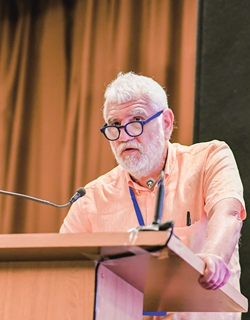
Fabio Marcelli, former director of the Institute for International Legal Studies, National Research Council of Italy
Fabio Marcelli, former director of the Institute for International Legal Studies, National Research Council of Italy, criticized some countries of using human rights causes as tools to contain other countries' development, including imposing sanctions or employing stigmatization.
Marcelli mentioned that the claim of so-called genocide in China's Xinjiang Uygur Autonomous Region is no more than propaganda and related topics have been instrumentalized. As for the Xinjiang region, the outside world can see China's measures in prioritizing its underdeveloped regions. If people promote development in the same way it has been in the region, many underdeveloped places around the world will benefit greatly.
Unity, not division
The Global Times reporters witnessed exchanges everywhere at the seminar, from official meetings to coffee breaks. To accommodate unfinished speeches, the opening ceremony in the morning was extended by a full hour.
During the seminar, mutual understanding and respect were stressed despite different views.
For example, in his speech, Wang Wen, executive director of the Chongyang Institute for Financial Studies at the Renmin University of China, mentioned that the sanitation conditions in some European cities, especially Paris, Madrid, and Milan had made an impression on him, pointing out that such poor conditions violate people's right to live comfortable lives in cities.
The high commodity prices and the crumbling infrastructure also perturbed Wang as he questioned whether Europe is indeed paying attention to human rights.
"The President of the European Commission Ursula von der Leyen is a bit like the Empress Dowager Cixi in the late Qing Dynasty (1644-1911). She is leading Europe into an infinite abyss," said Wang.
Wang noted that Europe may be suffering from the arrogance, ignorance, and laziness of some politicians and their lack of understanding of China's human rights development.
Wang's remarks led to some laughter and applause.
The seminar was also open to guests who had viewed China's human rights cause with prejudice.
The Global Times reporters learned that two staffers at the US Embassy in Italy were also present at the seminar that day. One of them was a counselor and the other was the first secretary in charge of human rights work.
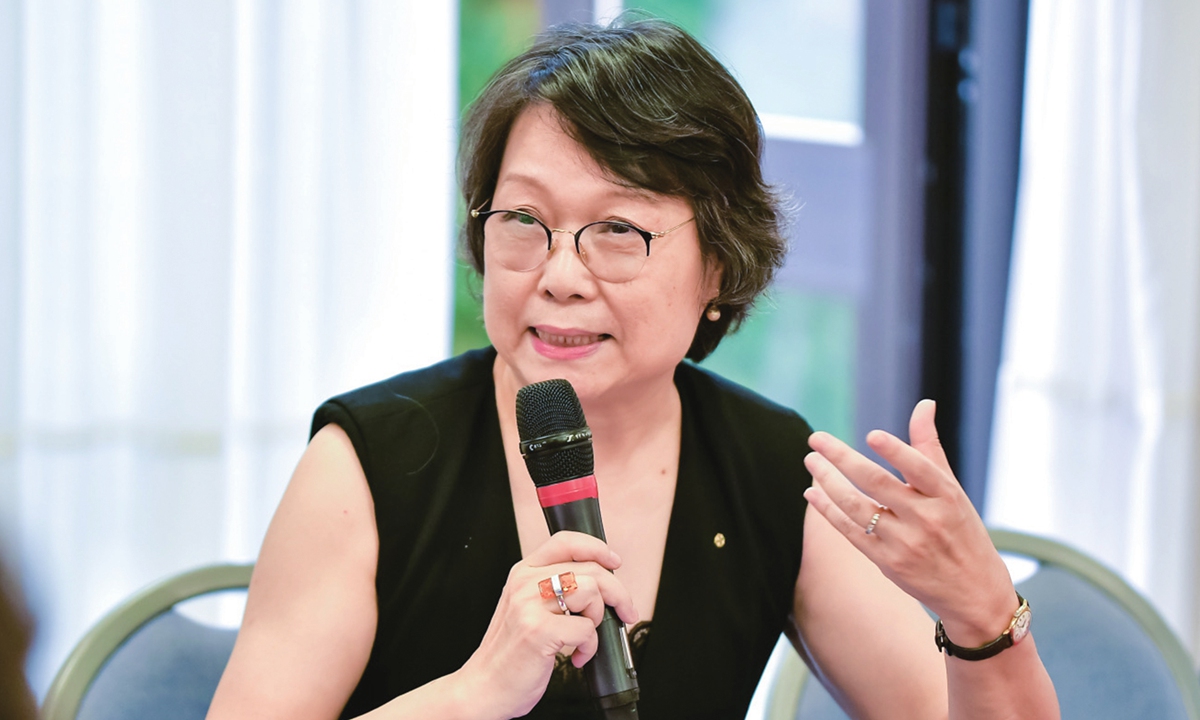
Hu Lanbo, chairperson of the Rome 9 China-Italy Economic and Cultural Exchange Center
The two staffers at the US Embassy in Italy registered and received confirmation from the organizer although they were not invited. They may have seen the invitation letters published by other invited guests, Hu Lanbo, chairperson of the Rome 9 China-Italy Economic and Cultural Exchange Center, who is in charge of conference affairs, told the Global Times.
At the seminar venue, Hu met an Italian journalist who had authored many articles criticizing China and another who had accused China of trying to eliminate the universality of human rights.
In a conversation with the reporter, Hu said, "Some people say that you are the enemy of the Chinese, but I don't believe that there are absolute enemies. Let's talk about China when we have time." The reporter agreed, after which the two took a photo at the venue.
Such scenes were also common at the previous China-EU seminars as the mechanism, which started in 2015 and has been held seven times in various cities in China and Europe, has become an important platform for Chinese and overseas scholars to exchanges views on human rights and dispel misunderstandings.
However, due to the influence of some anti-China politicians in the EU and the US, the anti-China stance has become "politically current" in the West, posing barriers in communication between China and Europe, analysts said.
It was not also an easy task to make this year's seminar happen, Hu said, noting that it took a total of three months of preparation to ensure the successful conclusion of the conference.
Due to the prejudice of certain political forces against China's human rights cause, the preparations work was at a standstill at times, according to Hu.
The Global Times also learned from some experts who attended the seminar that some of them have faced personal safety threats because they were accused of being "too close to China."
"Human rights have indeed been politicized. In 2015 and even before, the West 'liked' to talk to us about human rights. Later, when we used Chinese understanding to explain our view of human rights, the West suddenly felt that it was a challenge to their value system. They felt that 'China has inserted its ideology' and do not allow it. It is a pity that Europe is so unsure of its own values," Zhang Yonghe, executive director of the CHRS and executive director of the Human Rights Institute of Southwest University of Political Science and Law, told the Global Times.
"However, the more difficult we are in a situation, the more valuable the communication becomes. Human rights are an open concept, meaning that the development of human rights should be discussed by everyone," Zhang said.
Zhang also emphasized that Chinese and foreign scholars discussing human rights in Rome would also help more people to understand the essence of human rights under the view of the development of all humanity.

